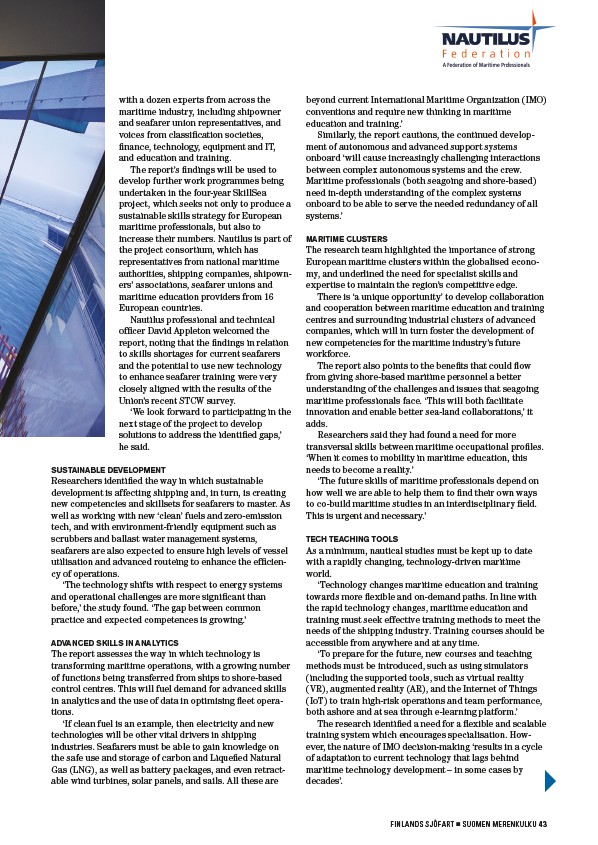
FINLANDS SJÖFART J SUOMEN MERENKULKU 43
with a dozen experts from across the
maritime industry, including shipowner
and seafarer union representatives, and
voices from classification societies,
finance, technology, equipment and IT,
and education and training.
The report’s findings will be used to
develop further work programmes being
undertaken in the four-year SkillSea
project, which seeks not only to produce a
sustainable skills strategy for European
maritime professionals, but also to
increase their numbers. Nautilus is part of
the project consortium, which has
representatives from national maritime
authorities, shipping companies, shipown-ers’
associations, seafarer unions and
maritime education providers from 16
European countries.
Nautilus professional and technical
officer David Appleton welcomed the
report, noting that the findings in relation
to skills shortages for current seafarers
and the potential to use new technology
to enhance seafarer training were very
closely aligned with the results of the
Union’s recent STCW survey.
‘We look forward to participating in the
next stage of the project to develop
solutions to address the identified gaps,’
he said.
SUSTAINABLE DEVELOPMENT
Researchers identified the way in which sustainable
development is affecting shipping and, in turn, is creating
new competencies and skillsets for seafarers to master. As
well as working with new ‘clean’ fuels and zero-emission
tech, and with environment-friendly equipment such as
scrubbers and ballast water management systems,
seafarers are also expected to ensure high levels of vessel
utilisation and advanced routeing to enhance the efficien-cy
of operations.
‘The technology shifts with respect to energy systems
and operational challenges are more significant than
before,’ the study found. ‘The gap between common
practice and expected competences is growing.’
ADVANCED SKILLS IN ANALYTICS
The report assesses the way in which technology is
transforming maritime operations, with a growing number
of functions being transferred from ships to shore-based
control centres. This will fuel demand for advanced skills
in analytics and the use of data in optimising fleet opera-tions.
‘If clean fuel is an example, then electricity and new
technologies will be other vital drivers in shipping
industries. Seafarers must be able to gain knowledge on
the safe use and storage of carbon and Liquefied Natural
Gas (LNG), as well as battery packages, and even retract-able
wind turbines, solar panels, and sails. All these are
beyond current International Maritime Organization (IMO)
conventions and require new thinking in maritime
education and training.’
Similarly, the report cautions, the continued develop-ment
of autonomous and advanced support systems
onboard ‘will cause increasingly challenging interactions
between complex autonomous systems and the crew.
Maritime professionals (both seagoing and shore-based)
need in-depth understanding of the complex systems
onboard to be able to serve the needed redundancy of all
systems.’
MARITIME CLUSTERS
The research team highlighted the importance of strong
European maritime clusters within the globalised econo-my,
and underlined the need for specialist skills and
expertise to maintain the region’s competitive edge.
There is ‘a unique opportunity’ to develop collaboration
and cooperation between maritime education and training
centres and surrounding industrial clusters of advanced
companies, which will in turn foster the development of
new competencies for the maritime industry’s future
workforce.
The report also points to the benefits that could flow
from giving shore-based maritime personnel a better
understanding of the challenges and issues that seagoing
maritime professionals face. ‘This will both facilitate
innovation and enable better sea-land collaborations,’ it
adds.
Researchers said they had found a need for more
transversal skills between maritime occupational profiles.
‘When it comes to mobility in maritime education, this
needs to become a reality.’
‘The future skills of maritime professionals depend on
how well we are able to help them to find their own ways
to co-build maritime studies in an interdisciplinary field.
This is urgent and necessary.’
TECH TEACHING TOOLS
As a minimum, nautical studies must be kept up to date
with a rapidly changing, technology-driven maritime
world.
‘Technology changes maritime education and training
towards more flexible and on-demand paths. In line with
the rapid technology changes, maritime education and
training must seek effective training methods to meet the
needs of the shipping industry. Training courses should be
accessible from anywhere and at any time.
‘To prepare for the future, new courses and teaching
methods must be introduced, such as using simulators
(including the supported tools, such as virtual reality
(VR), augmented reality (AR), and the Internet of Things
(IoT) to train high-risk operations and team performance,
both ashore and at sea through e-learning platform.’
The research identified a need for a flexible and scalable
training system which encourages specialisation. How-ever,
the nature of IMO decision-making ‘results in a cycle
of adaptation to current technology that lags behind
maritime technology development – in some cases by
decades’. A